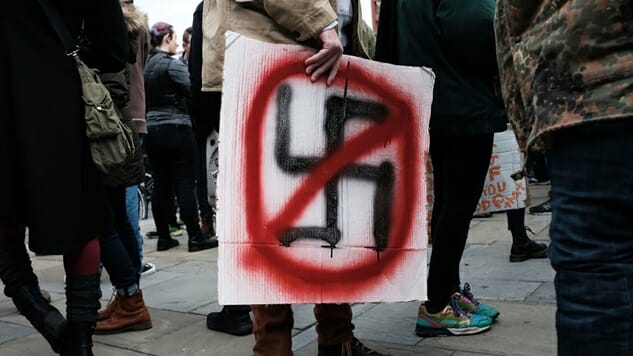Facebook Finally Bans White Nationalism
Photo by Spencer Platt/Getty
White nationalism should not be classified as normal speech, because its thesis infringes upon other people’s freedom. According to Hitler, someone like Martin Luther King Jr. has no room in his utopia. This ugly truth was on display in the horrific mosque attacks in New Zealand that killed 50 Muslim worshippers. That event, streamed on Facebook Live, is the logical conclusion of white nationalism. Which means that companies like Facebook, YouTube and Amazon—who have all elevated white nationalism thanks to their algorithms and the scale of their platforms—have a hand in these heinous acts committed in the name of white supremacy that is whipped up on their platforms 24/7.
Today, some good news finally broke on the dystopia beat, as Motherboard exclusively reported that Facebook is banning white supremacy. Per Motherboard:
In a major policy shift for the world’s biggest social media network, Facebook banned white nationalism and white separatism on its platform Tuesday. Facebook will also begin directing users who try to post content associated with those ideologies to a nonprofit that helps people leave hate groups, Motherboard has learned.
…
Last year, a Motherboard investigation found that, though Facebook banned “white supremacy” on its platform, it explicitly allowed “white nationalism” and “white separatism.” After backlash from civil rights groups and historians who say there is no difference between the ideologies, Facebook has decided to ban all three, two members of Facebook’s content policy team said.
“We’ve had conversations with more than 20 members of civil society, academics, in some cases these were civil rights organizations, experts in race relations from around the world,” Brian Fishman, policy director of counterterrorism at Facebook, told us in a phone call. “We decided that the overlap between white nationalism, [white] separatism, and white supremacy is so extensive we really can’t make a meaningful distinction between them. And that’s because the language and the rhetoric that is used and the ideology that it represents overlaps to a degree that it is not a meaningful distinction.”
If you have information or documents about a policy inside a social media giant you’re concerned about:
Signal: +44 20 8133 5190
Wickr: josephcox
SecureDrop: https://t.co/rBx17eFJyP
Don’t use a work phone or computer.— Joseph Cox (@josephfcox) March 27, 2019
This is a big deal. We have become conditioned to dismiss stuff that happens on the internet as confined to some digital space walled off from “the real world.” The problem is that we live in a world where the tangible reality around us has interwoven with the digital space we all spend most of our time in. There is no distinction between the two, and one affects the other—as the Christchurch mass shooting proves. Tech platforms need to take this seriously and they simply have not done so yet.
Hopefully, the murder of 50 worshipers amplified by and disseminated on these platforms has awoken the executives from their slumber. Facebook and YouTube are two of the biggest forces for white nationalist radicalization today (outside of the Republican Party). Their algorithms push people towards this content because it clearly makes them money. It is really not a stretch to call what these people are raking in “blood money,” given that white supremacist terrorism is really the only kind of terrorism that modern America experiences. This is an important first step by Facebook in a long, long journey to treat an ideology responsible for the murder of millions (billions?) as the existential threat to humanity that white supremacy has always been.
Jacob Weindling is a staff writer for Paste politics. Follow him on Twitter at @Jakeweindling.







































